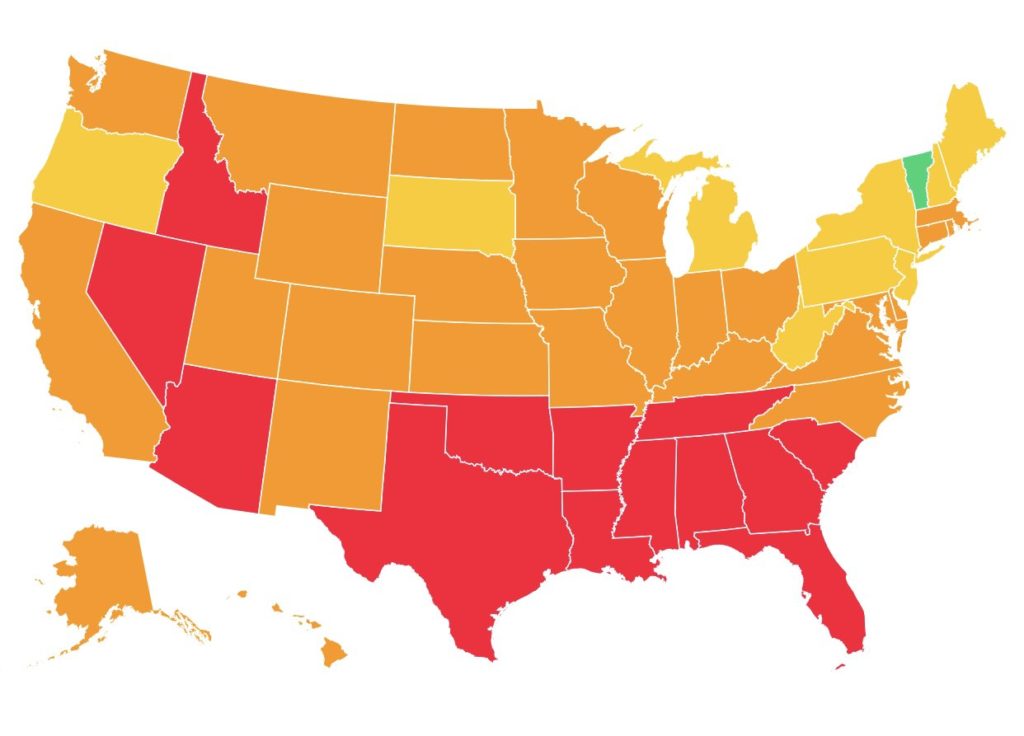July 31, 2020
This week saw accolades and envy from other states as Vermont’s investments in preventative measures to box in the virus have shown results. However, Vermont also saw its first fatality in over 43-days this week and as we look towards a fall involving college students returning, kids going back to school, and the inevitable retreat from the cold indoors, it is clear that we cannot rest on our laurels and must continue to be vigilant.
Meanwhile, in our nation’s capital, Congress is proving to be the opposite of progress in turning around our country’s lackluster performance in this pandemic thus far. Funds that America’s people, businesses, and state governments so desperately need to combat this virus are trapped in a political impasse.
In this week’s update;

Chittenden County Senate District Candidate Questionnaire
The race for Chittenden County Senate is unique this year as there are two open seats, and the district will soon be redistricted. The Lake Champlain Chamber wants to provide information to voters to equip constituents with knowledge of their candidates and encourage voter participation. To do so, LCC sent a concise survey to candidates asking them to explain;
- If Vermont is businesses friendly,
- Why business owners should support them, and
- What can be done to create more well-paying jobs in Vermont?
We’ve compiled their answers as well as their short biographies and links to their websites and social media channels so that you feel informed.
New School Start Date; Mask Mandate and More Retail Capacity
Governor Scott announced at a Tuesday press conference that he would sign an executive order calling for a universal school start date of September 8, 2020, to give schools more time to test and fine-tune plans for the start of the academic year. A day previously, the Vermont chapter of the American Academy of Pediatrics called for schools to prioritize in-person education for the coming school year. In a commentary in the New Yorker this week, environmental activist and Middlebury professor Bill McKibben, who would otherwise be a harsh critic of Governor Scott, commended his performance guiding the state through these tumultuous times and explained:
The sacrifices of the spring and the summer will be rewarded next month, when kids start climbing back on the school bus. Obviously, it won’t be simple—some schools are going for hybrid systems, or asking the state to push back opening day a week, to get new protocols in place. But just contemplating something like a normal school year is an enormous payback: I know kids who are due to start kindergarten this fall, and now they’ll be able to begin their careers as students in the right way, and not hunched over a tablet staring at a virtual teacher.
Indeed, Vermont’s sacrifices have proven the age-old adage that “an ounce of prevention is worth a pound of cure” and the wisdom of our strategy of methodically “opening the spigot [on the economy] a turn at a time” while employing different “tools in our toolbox” as needed is becoming even more clear. Today, the Governor announced that the state will start distributing masks to municipalities with the goal of distributing up to 200,000 free masks to help compliance with the new mask mandate.
As we look toward the return of college students, more tourists, and school re-opening, Scott announced the use of a tool that he had been reluctant to employ to date, a mask mandate which goes into effect tomorrow, August 1st. On the same day, retail businesses, many of whom have had to make do with a few customers at a time, will see an increase in capacity from 25% to 50%. Our continued application of safety measures, as well as our compliance to those safety measures, is what is allowing our communities to return to some degree of “normalcy.”
The Lake Champlain Chamber is engaging with employers and others in our community to help find solutions to the challenges school schedules might create for your employees. If you have any questions or suggestions, reach out to [email protected].
Vermont Economic Recovery Grants Still Available
Funds are still available to Vermont businesses who can demonstrate a revenue decline of at least 50% in any one-month period from March 1, 2020 to August 31, 2020, when compared with the same month in 2019. The Economic Recovery Grants landing page has full details, including eligibility requirements, document preparation instructions, and a series of FAQs to assist businesses in completing the application. We encourage businesses to review the guidelines and apply even if you think you may not be eligible. This process will provide information for future relief as well.
The fact that funds are still available might come as a surprise, however, the legislation governing the program restricts grants to those who can show a decline in revenue of at least 50%. LCC provided feedback during the writing of this legislation explaining that many businesses had suffered revenue losses smaller than that, often due to their grit and persistence to hang on, and would still need assistance. Unfortunately, the language governing the program cannot be changed without legislative action.
Federal Update and What it Means for Vermont
On Monday, the Senate GOP rolled out a package of bills referred to as the HEALS Act that match what we reported it would look like in our advocacy update last week. As we discussed last week, HEALS is thought of as a starting offer for the Republicans, or even as a counteroffer, as the House, under the control of the Democrats, had already passed their own $3 trillion relief package, the HEROES Act, about 10 weeks ago. Negotiations have not proven productive with both parties, as we predicted last week, drawing bright red lines over their non-negotiable components of the package. It’s turned the entire negotiation into a staring contest, and Americans are left to wonder who will blink first?
As we covered last week, chief among the discrepancies between the two parties is the enhanced unemployment benefits, the Pandemic Unemployment Compensation (PUC). This $600 add-on to whatever a state benefit equates to is set to expire today. Nationally, unemployment claims are up for the second week in a row this week. Reports showed that the U.S. economy this week saw its largest economic contraction in almost a century in the last quarter.
The impasse grew as Senate Majority Leader Mitch McConnell was unwilling to budge one inch on the liability protection included in the package, and House Speaker Nancy Pelosi was reluctant to budge on the extension of the PUC benefit. A Republican proposal came forward late in the day that would extend the PUC benefit for a week while the rest of the package was negotiated, however, this was dismissed by Senate Democrats as for many states (such as ours) the measure wouldn’t be timely enough and experts say it would take weeks to reestablish.
The jockeying might have worked, as the White House reportedly signaled last night that they are willing to drop the Senate Leader’s liability shield priority in favor of getting a deal through quicker on unemployment. Congress has left town for the weekend, however, leadership will likely be negotiating until they reconvene Monday. The stop in benefits will impact millions of Americans and thousands of Vermonters on unemployment negatively, with ripple effects throughout our economy in the meantime.
Other components of the Federal Debate:
No New Money for CRF
Another issue with the Republican Senate bill is that it contains no new Coronavirus Relief Funds (CRF) to states, however, it does provide flexibility for already allocated funds. What it does provide is a very necessary extension on the timeline to utilize these funds – currently on December 31st – to 90-days past the end of a state’s fiscal year to *obligate* funds. However, a sticking point exists around how much of CRF going to local communities with the bill containing a requirement that if the state uses funds for revenue replacement 25% goes to local communities. The Democrats are continually pushing for increased local assistance.
What does this mean for Vermont?
More flexibility will certainly be welcomed by anyone who has experience in this area and an extension of the deadline to obligate the funds, whereas right now it is to spend the funds, will mean technical assistance and similar programs are not working with an ax over their head. On the other hand, the local community component required to utilize funds for revenue backfill makes the provision not practical for Vermont.
This week, the Joint Fiscal Committee did hear that the state saw an unexpected revenue boost in July, due to the strong performance of the economy in the previous quarters of the last fiscal year, before the virus hit. Even still, there is a large deficit to be made up when they return in late August.
Some larger items have appeared in the package with less controversy.
Capital Loan Program
The Senate GOP is worried about their unpopular president wrecking their chances of maintaining their control of the Senate, putting extra stress on these negotiations. One Senator that could lose their seat as part of a Democratic party sweep is Susan Collins (R-Maine) who is looking at tough re-election prospects according to recent polling. One such item is a big, $100 BILLION working capital loan program in the new GOP pandemic relief bill. Eligible small biz in low-income areas and/or seasonal businesses would be eligible to borrow up to two-time their annual revenue at 1% and pay it back over 20 years. To be eligible, businesses must have suffered a 50% drop in revenue in a quarter, be in a low-income census tract, or be a seasonal business.
What does this mean for VT?
We have many businesses that could meet the eligibility criteria for these loans and with uncertainty over what the fall and winter could bring, the loans could provide needed relief to many.
Second Round of PPP
The bill seeks to recapture funds allocated to the SBA 7a program under the CARES Act (about $190 million) that are set to expire soon and then adapt the program to add categories of eligible expenses. Additionally, after a great deal of feedback from businesses and financial institutions, the bill streamlines forgiveness of loans under $150,000 with a graduated easing of streamlining efforts as loans get bigger.
Businesses that already received a PPP could go back for a second draw if they meet eligibility criteria. The proposal also adds eligibility for 501(c)6s. These elements are uncontroversial.
What does this mean for VT?
80% of all PPP loans in Vermont are under $150,000, so any streamlining or flexibility will help the state’s small businesses bounce back. Additionally, extending the loans to (c)6 organizations will mean that many non-profit organizations will be eligible to receive some form of assistance for the first time since this pandemic started. Finally, many businesses can benefit from a second draw which would offer broaders categories to apply funding, such as safety equipment.
A fantastic breakdown of the differences between the two packages was published in USA Today this morning.
As so much of the fate of our state is tied to federal action, LCC’s advocacy team has been spending more time tracking federal legislation. This week, LCC began facilitating a weekly call with other Vermont business organizations and service providers to provide access to our congressional delegation’s staffers working on these issues. We hope that this effort to bring everyone together and work collaboratively will best serve Vermonters.
Most Frequently Asked Questions this Week
If I have someone who tests positive for COVID – does the company need to shut down until everyone is tested?
The Vermont Department of Health has published this helpful document to walk through such a scenario.
What does a mask mandate mean for businesses?
It shouldn’t mean much of a change other than customers coming through the doors will now need to wear a mask, and failure to comply is not just a violation of the business’s policy, but also the state’s mandate. Employees have been required to wear masks since March per the Stay Home, Stay Safe Order’s Mandatory Health and Safety Requirements for All Businesses: “employees must wear face coverings over their nose and mouth when in the presence of others.”
The Laundry List
- Governor Phil Scott today announced that the Vermont Department of Public Service has launched a Line Extension Customer Assistance Program (LECAP). LECAP provides up to $3,000 in assistance to help consumers extend telecommunications lines to their homes, with $2 million in total funds available.
- Temporary suspension of limits on charitable contributions – The CARES act suspended limits on charitable contributions for individuals and corporations. Individuals may deduct qualified charitable contributions up to 100 percent of their adjusted gross income. A corporation may deduct qualified charitable contributions up to 25 percent of its taxable income. Both individuals and corporations can carry over to the next year’s contributions that exceed the AGI limitation. Additional information about tax relief for those affected by the COVID-19 pandemic is on IRS.gov.
- Temporary increase in limits on contributions of food inventory – The CARES act created a special rule allowing greater deductions by businesses for contributions of food inventory for the care of the ill, needy, or infants. Businesses that contribute to food inventory in 2020 may deduct up to 25 percent of their net income or taxable income. Additional information is available on IRS.gov.
- Event Assistance – Hosting a big event? Want another set of eyes on your plan? The Lake Champlain Chamber facilitated an ad hoc working group that helped draft the restart guidance for large events and that group is willing to serve as a peer review team for others who are attempting to navigate the guidance. For more information, email [email protected].
- Champlain Parkway – The public comment period for the Limited Scope Draft Supplemental Environmental Impact Statement (LS DSEIS) is open from July 10, 2020 to August 24, 2020. The public is invited to submit comments on the LS DSEIS in writing at the public hearing, through the mail, email, or on the project website. Verbal comments can be made during the public hearing or by telephone. champlainparkway.com/nepa/.
Concerned or need to learn more about anything in this newsletter? Email our team at [email protected].
We look forward to working with you.
Sincerely,
The Lake Champlain Chamber Advocacy Team


